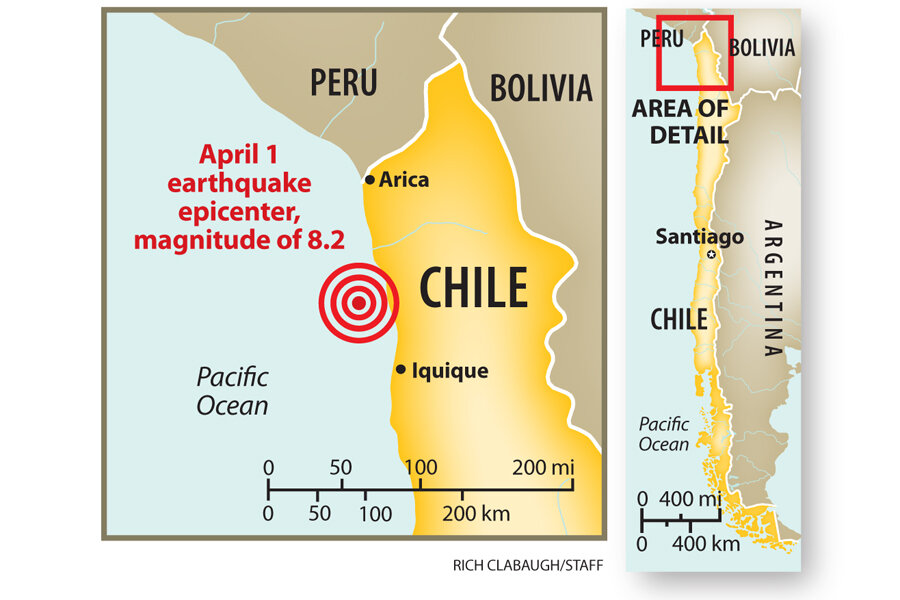California and Chile earthquakes giving you jitters? Relax, say geologists.
Loading...
| Los Angeles
Details from the devastating magnitude-8.2 earthquake in Chile are arriving on the heels of two, recent Los Angeles-area temblors and one March 10 off the northern California coast. The cluster has some casual quake-watchers a bit more jittery than usual.
As the news fills the airwaves and Internet, the public is naturally asking if the quakes are related and whether they are signs of some bigger global disasters looming, say geologists who are fielding such inquiries from the press and the public alike.
Getting a clearer picture of the science behind earthquakes can be hard in a 24/7 news cycle focused on human drama, they say. But understanding the science behind the global seismic activity is an important first step in calming fears and getting residents to take steps to prevent loss.
“I just got off the phone with the local radio station and these are the questions they all want to know,” says Frank Galgano, chair of the geography and environment department at Villanova University in Philadelphia.
The bottom line? While the recent earthquake activity in northern and nouthern California is related somewhat, the quake in Chile occurring at roughly the same time is a geological coincidence.
“Those are completely separate plates with separate tectonic activity down there in Chile,” says Professor Galgano. “The Pacific plate and the North American plate driving the California faults in Hayward and San Andreas will create aftershocks all along the West Coast of the US, but not several thousand miles away in Chile.
“It is the 24-hour news cycle that makes these larger events happening together seem more threatening,” he says.
That same media attention, however, can help spread awareness of the growing science of loss and damage prevention, says geologist Chris Wills at the California Geological Survey (CGS) in Sacramento.
“I actually think it’s more important for people to understand the various ways that quakes can hurt you than for them to grasp the somewhat abstract science behind what causes the quakes,” he says. His agency, for instance, is responsible for communicating about safety products that can be used by geologists and nonprofessionals alike.
In support of National Tsunami Preparedness Week, March 23-29, for instance, the CGS provided preparedness kits and tsunami maps for local schools and science programs.
“Earthquakes are singular events because there is virtually no warning,” he says, so it makes a difference knowing what to do for instance, when one strikes. “Knowing where you should go … in your community can make the difference between being safe and suffering serious loss,” he adds.
Beyond that, says Mr. Wills, a lot of work has gone into understanding what makes buildings more or less vulnerable in earthquakes. “I would feel a lot better if people knew more about how to make themselves safe in a quake than if they understood what was causing that quake,” he adds.
Nonetheless, points out Villanova’s Galgano, it helps to understand that earthquakes are not rare events. Seismic activities are occurring continually around the globe, he points out.
In the week between March 14 and March 20, for instance, according to the US Geological Survey, there were 1,543 recorded tremors, including those of all magnitudes in the United States and its territories and elsewhere.
Most are small enough not to attract attention, he adds. “But earthquakes are a normal part of this planet’s activity,” he says, and understanding that scientific fact is as important as following the news coverage of any particular event.






